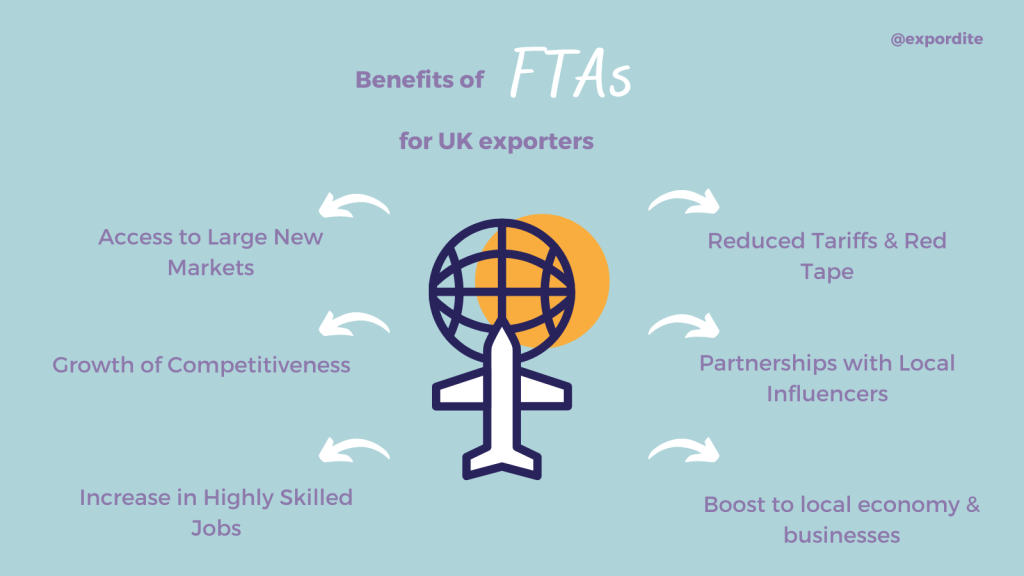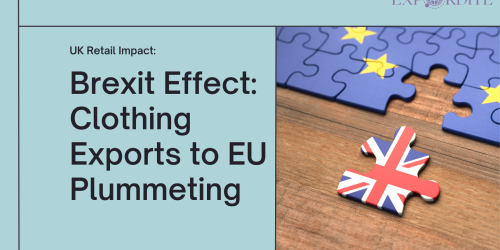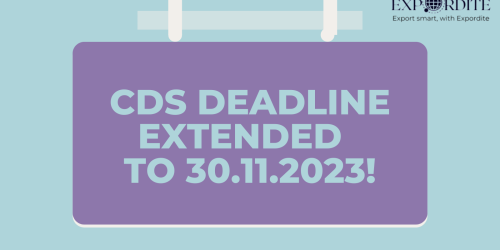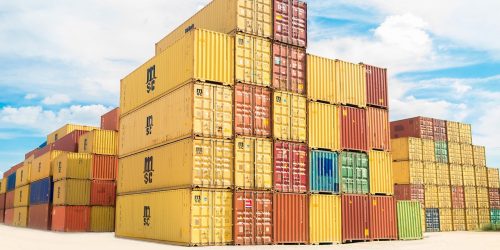How Free Trade Agreements Can Help UK Exporters

Disclaimer: this post contains affiliate links.
This week, many international traders finally got the news that the Northern Ireland Protocol talks have been finalised, and the deal has been struck.
Also known as “The Windsor Framework“, the deal is supposed to make it easier for UK traders to sell to Northern Ireland in terms of customs formalities.
We’ll keep a close eye on how this deal will work in practice and put together a guide once everything is finalised.
But for now, let’s take a look at other trade agreements, known as FTAs, and how they can benefit UK exporters.
What are FTAs?
Free Trade Agreements, or FTAs, are contracts, or treaties between countries that reduce or remove international trade barriers, such as customs duties and tariffs.
That means that businesses in one country (e.g. UK) has an easier time breaking into a foreign market (e.g. Peru), if the UK has an FTA with Peru.
To give you some examples of possible benefits:
- The UK business wouldn’t need to pay high tariffs and thus be more competitive in the Peruvian market;
- It can enjoy IP protection in Peru, and
- It can even be a Peruvian government contractor.
Of course, not all FTAs are the same, and very few remove trade barriers entirely. However, the UK has several FTAs in place, from which the UK exporters can benefit.
UK’s FTAs in Place
You can view the list of the FTAs the UK (excluding the EU Trade & Cooperation Agreement) has signed here. The UK enjoys the benefits of 42 FTAs that have been fully ratified, and 26 FTAs subject to provisional application. The latter means that the agreement’s provision apply even before it’s formally in force.
Trade with the EU is regulated by this FTA.
How Can FTAs Help UK Exporters?
Access to Large New Markets

Businesses that were selling abroad in Q2 of 2022 had a 10X growth rate than companies that only sold domestically. This kind of revenue growth isn’t surprising, given the size of the world’s population and target audiences.
For example, if the UK does end up joining the CPTPP agreement, it’ll open up opportunities for British exporters to reach over 500 million customers. Even if only 1% of that is reached by a UK business, it’ll mean 5 million customers will buy their product, which for many businesses is more than their domestic audience.
Reduced Tariffs & Red Tape
Compliance with customs formalities and tariffs can be expensive and take up a lot of time to get right. As a result, traders are forced to charge foreign customers higher prices, thus making their offerings less attractive in the international markets.
FTAs which reduce tariffs on goods imported from the UK can address this issue. Not having to account for such tariffs means businesses can keep their pricing competitive with those of the local vendors. And as a result, companies can operate under Incoterms advantageous for both parties.
Opportunities to Grow Competitiveness
If a business operates in more than one market, it has opportunities to learn from more than one market, and get to know several target audiences well. That would enable the business to respond better to the needs of various audiences, allowing it to become more competitive.
And, given the massive amount of data generated by target audiences, businesses would be able to derive a lot more insights from it than they otherwise would have with only a domestic audience.
Opportunities to Partner with Local Thought Leaders & Influencers

Influencers are a marketing powerhouse. Most countries have some sort of social media channels, and the biggest markets in the world have millions of customers on Instagram.
Thanks to the FTAs, companies not only get more opportunities to sell their products abroad seamlessly, but they also get new partnership opportunities, such as those with local influencers. Many target audiences, especially in the D2C space, would encounter a product from abroad for the first time on social media. That would have a significant impact on their purchasing decision, which is what influencers are all about for businesses.
We’ll shortly put together a more comprehensive guide to influencer marketing for exporters – but for now, keep in mind that FTAs can significantly help with such partnerships.
Highly Skilled Jobs & Skills Development Opportunities

As we mentioned earlier, FTAs mean new market opportunities. But they also mean new jobs and opportunities for developing different skills.
The most basic example of this is language and localisation skills. Although many customers abroad speak English very well, it’s not universal. By breaking into international markets with the help of FTAs, UK businesses create job opportunities for people with foreign language skills.
For example, if a candidate has a degree in Foreign Languages, they probably spent some time abroad and have an understanding of that country’s market and cultural differences. Those skills could be invaluable to UK traders that want to trade with that country, but have little experience of doing so.
Many traders, especially in the D2C space, know the importance of localisation very well, and having a person on staff familiar with specific markets can help avoid marketing blunders & damage the brand’s reputation abroad. Therefore, trade opportunities facilitated by FTAs create jobs opportunities for people with such skills.
Product development skills is another example. The UK is an important innovation hub, but its cross-border innovation ambitions cannot be achieved if there are trade barriers in place preventing innovative businesses from breaking into global markets. But if the FTAs significantly reduce such barriers, it can stimulate the UK innovators to do just that and invest in product development skills in their field – whether it’s manufacturing, inventing, or software development.
Boost to Local Economy & Small Businesses
It seems almost paradoxical to say that exporting to different countries would benefit UK’s small businesses which are used to serving their local communities. And yet, it’s true. As of 2021, over 6,000 SMEs from across the UK were exporting to New Zealand alone.
As our partners at ABTS Training said, your region’s biggest exporter could be where you live! Recent trade shows abroad show that to be true. For example, over a dozen Welsh SMEs were present at the world’s biggest food trade shows in Gulfood last month. Many of them started out as small high-street businesses or family-run farms. And thanks to the FTAs, they’ll be able to not only find new customers around the world and spread the word, but also find great trading partners that can help them break into those markets.
Further Resources
Do you want to know more about FTAs & how they can help you?
Check out these resources below:
- ABTS Training – today is the last day to enroll!
- Export Finance
- The Institute of Export and International Trade
- UK FTAs in effect








2 Responses